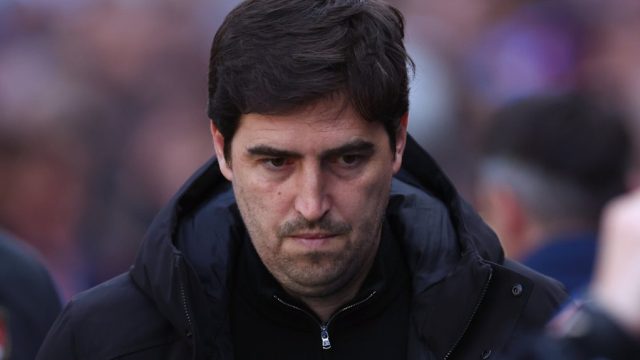The debate surrounding Andoni Iraola’s readiness for a major Premier League role continues to stir conversation. While Bournemouth’s recent victory over Fulham offered a glimmer of optimism, their subsequent performance against Crystal Palace reignited concerns.
In that match, Bournemouth struggled immensely to generate any meaningful attacking threat, continuing a worrying trend. Iraola’s side has managed just one win in their last ten outings across all competitions, scoring multiple goals in only two of those games.
Monday’s match contained moments that could have shifted the momentum. Alex Scott’s fortunate escape from a second yellow card mirrored the incident that saw Palace reduced to ten men.
Ironically, it seemed Bournemouth might have benefited more from facing a full-strength Palace. Before the red card, Palace’s adventurous full-backs created gaps that players like Antoine Semenyo and Dango Outtara could exploit. Once down to ten, Palace sat deeper, conserving energy and presenting a different challenge entirely.
Bournemouth found themselves tasked with breaking down a resolute, defensive unit, a challenge they completely mishandled. In the second half, they recorded a meager expected goals (xG) figure of 0.28 from nine attempts, relying mostly on deep crosses and speculative long-range efforts that rarely threatened.

This performance highlights a broader issue that has emerged during Iraola’s tenure. When Bournemouth dominate possession, they often struggle to translate that control into points.
In the nine league matches where Bournemouth have enjoyed their highest possession percentages, they have managed only ten points.
In stark contrast, when they have had their lowest possession shares, they have secured twenty points. The pattern suggests that Iraola’s system thrives more in reactive situations, exploiting spaces left by opponents, rather than when tasked with dictating play against compact defenses.
Speculation about Iraola’s future remains vibrant. Reports from The i Paper indicated last week that Bournemouth are keen to tie him down with a new contract, even as bigger clubs, such as Tottenham Hotspur, monitor his progress.
For Iraola, staying at Bournemouth could provide a valuable opportunity to refine the more intricate aspects of his managerial approach.
Developing a strategy capable of dismantling stubborn, deep-lying teams will be crucial if he is to truly elevate his profile and prepare for the demands of a top-six club.
The glaring weakness in Iraola’s current coaching repertoire is no longer a hidden flaw. Opponents have increasingly recognized Bournemouth’s struggles against defensive setups and have adapted accordingly.
For all the promising aspects of his tactical blueprint — particularly the energetic pressing and swift counterattacks — the inability to impose themselves creatively in dominant phases casts a shadow over his immediate suitability for elite roles.
Andoni Iraola remains a manager of considerable potential. His achievements with Bournemouth, particularly the energizing transformation earlier in the season, have not gone unnoticed.
However, the leap to one of the Premier League’s powerhouses demands a more versatile skill set. Until he demonstrates the ability to consistently unlock tightly organized defenses and maintain success even when his side controls possession, skepticism about his readiness for a big-six appointment will persist.
There is still time for growth. Should he choose to extend his stay at Bournemouth, Iraola will have the platform to confront and overcome these tactical shortcomings.
Success in that endeavor would not only strengthen Bournemouth’s position but also bolster his credentials for the next step in his managerial journey. For now, though, the question remains open — tantalizing but unanswered.
